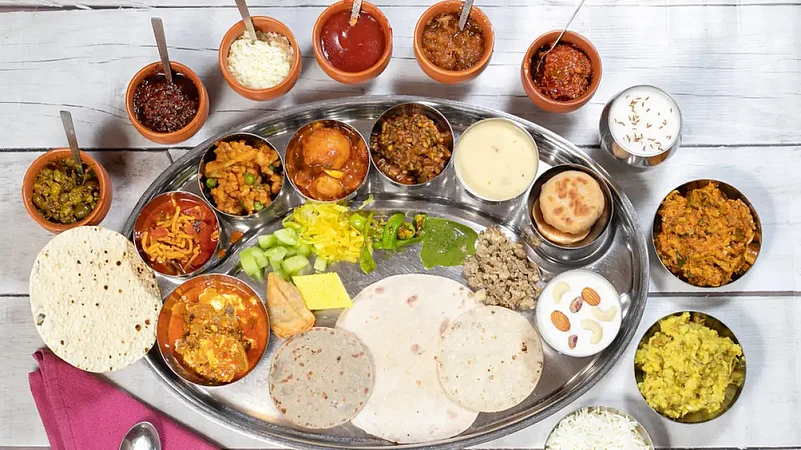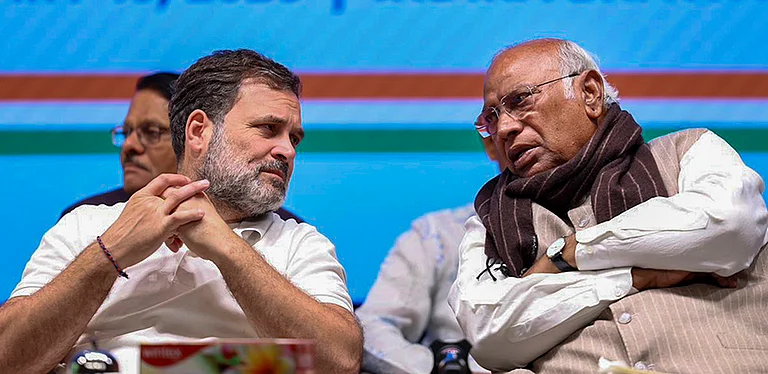Gujarati cuisine is predominantly influenced by the state’s geography, history, and culture. The food varies across regions, and cuisines. A typical meal in most Gujarati households comprises rotli (a flat bread), dal or kadhi, shaak (a dry or gravy-based vegetable preparation), kathol (a preparation made from pulses or whole beans), farsaan (a snack item), and rice. Most Gujarati dishes are an unusual combination of sweet, salty, and spicy flavours. And of course, everything is held together by an array of condiments and rounded off with a mishthaan (sweet dish). If you find yourself always on the lookout for hyperlocal food, follow this culinary trail through Gujarat:
Ahmedabad
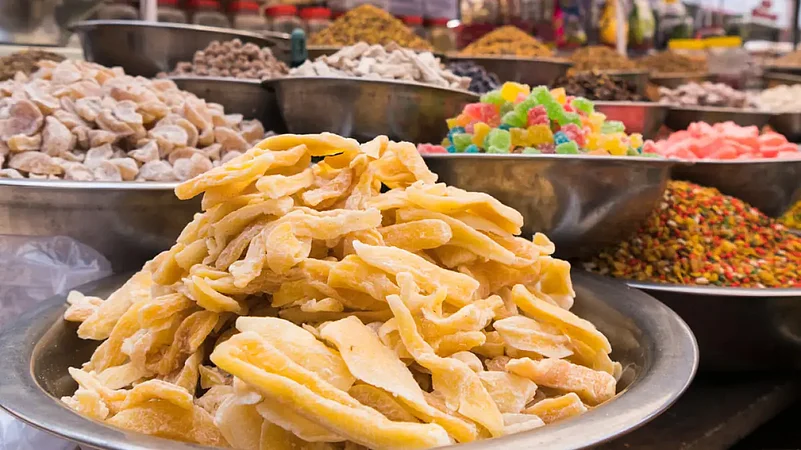
The largest city of Gujarat and the former capital of the state, Ahmedabad is a gastronome’s delight. This is where the supremely popular Gujarati Thali was served for the first time—way back in 1900 at the Chandravilas restaurant, which still continues to delight food lovers.
Where to go and what to eat
Apart from the many ritzy, upmarket restaurants and cafés around the city, the streets are also a treasure trove. Manek Chowk is a must-visit. A vegetable market by day, the square transforms into a bustling, street food market by night. Surrounded by the many heritage pols, the stalls serve a variety of food. Sandwiches, Gujarati delicacies, south Indian, chaat, kulfi...don’t miss the Pav Bhaji and the Chocolate Sandwich/Pizza. At Law Garden, located in the newer part of the city, the Khau Galli provides welcome relief after some dedicated shopping. Try the Chaat, Pani Puri, Dosas, Uttapams, Idlis, Dhokla, Pav Bhaji, Dabeli, Kulfi, ice cream, and Indianised versions of Chinese and Italian snacks. Head to Bhatiyar Gali for a variety of non-vegetarian food.
Rajkot
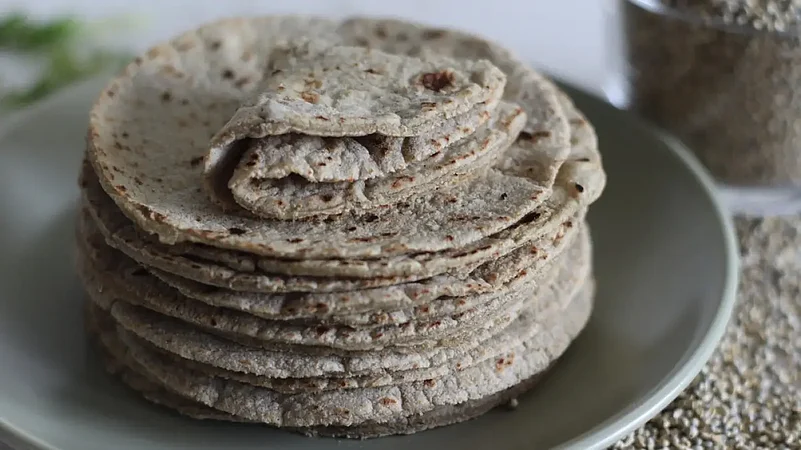
In the heartland of Kathiawad, you’ll find food that’s much spicier than what you find across Gujarat. The food here and in nearby Bhavnagar, Jamnagar, Surendranagar, Porbandar, Junagadh, Botad, Morbi, and Gir-Somnath, has strong Rajasthani influences.
Where to go and what to eat
Don’t miss the Kathiawadi Thali, which is much spicier than the Gujarati variant and takes into consideration the climate and the availability of fresh produce. Staples include Talela Marcha (fried green chillies), Rotla, and a couple of vegetables—Sev Tamata nu Shaak, Papad nu Shaak, Lasania Bataka, or Ringan nu Olo, and, of course, Chaas. Delicacies like Rasawala Dhokla, Bajra Bhakri, Methi Thepla, Kathiawadi Akha Adad, Kathiawadi Stuffed Onion, and the Dhokli nu Shaak must not be miss. If you have time, head to Jamnagar to enjoy the Ghooto, a mixed vegetable and lentil curry best enjoyed with crumbled rotla. In Bhavnagar, don’t forget to stock up on the Ganthiya, the dry snack.
Bhuj
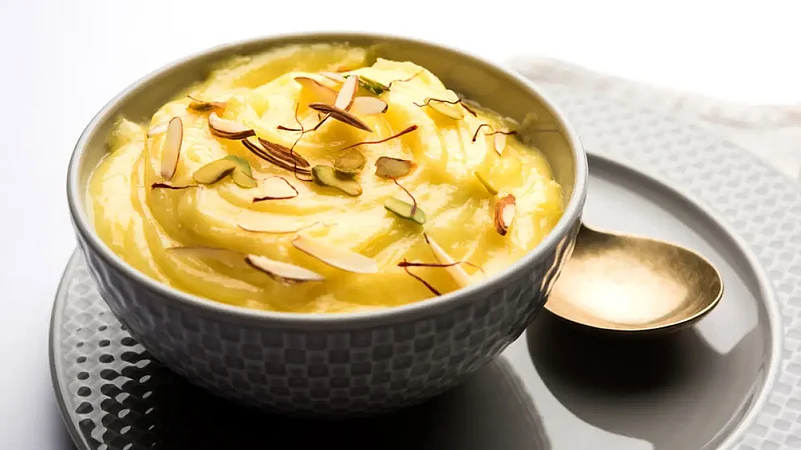
The people of dry and arid Kutch believe in “simple living and high thinking”. Their food follows this line, and is simple and satisfying. The nutritious meals must always be washed down with a glass of chaas!
What to eat
Kutchi cuisine uses minimal oil and favours the leelo masallo. The meals are simple, and include Kadhi, Khichdi, and Bajra no Rotlo with a smattering of hardy vegetables such as Guvar nu Shaak. Dairy products are abundantly used as people in the arid region have a large population of livestock. Shrikhand is often the favoured dessert. Kutch offers some special items that are best served here: Dabeli, a Kutchi cousin of Mumbai’s Vada Pav; the Kutchi Pakwan, a deep-fried dry snack made out of maida and ajwain that resonates the Sindhi Dal Pakwan; and the Gulab Pak, a delicate barfi made from rose petals, milk, and sugar, and garnished with chopped and toasted almonds, cashew nuts, and pistachios. When in Bhuj, one must also make sure to visit the legendary Khavda Sweet and Farsan, which is famous for its pure sweets, dairy products, namkins and dryfruits.
Vadodra
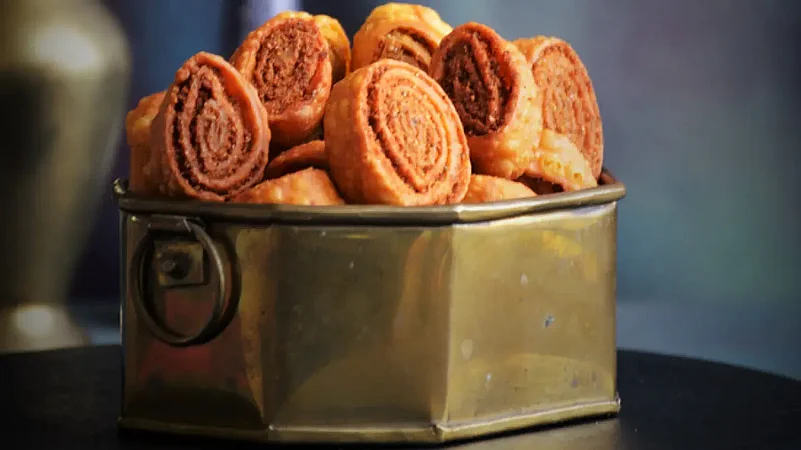
The multicultural ethos of Baroda has its roots in the vision of Sayajirao Gaekwad III, the Maharaja of Baroda State from 1875 to 1939. The cultural capital of the state is known for its love of food.
Where to go and what to eat
Vadodara has plentiful Gujarati restaurants offering their versions of the thali, but there are plenty of options for those who love their street food. In the heart of the city, Sursagar, is a street food hub in the evening. Stalls offering chaat, samosas, sandwiches, and golas pick up pace as night falls. In Mangal Bazaar, the moong dal kachoris at Pyarelal ki Kachori, and the ice cream at Samrat—a store that’s been around since the 1950s—are great.
At Ratri Bazaar, a food market located in the busy area of Karelibaug, over 40 eateries and stalls sell anything you may be in the mood to eat. From Khichu and momos to dosas and chaat, everything’s available at this eat street from 5pm to 1am.
Any trip to Vadodara is incomplete without relishing the delectable Duliram na peda at Pendawala Duliram Ratanlal Sharma located on Raopura Main Road. Another eatery that you must visit is Jagdish Farshan, which was established in 1938. Located on Ajwa Road, the shop is known for its bhakarwadi, lilo chevdo, suko chevda, sweets and namkins.
You can’t leave Vadodara without savouring the Sev Usal. The spicy and tangy pea curry tastes best topped with chutneys, chopped onions, and scooped up with white buns. Don’t forget to try the Lilo Chevdo.
Surat
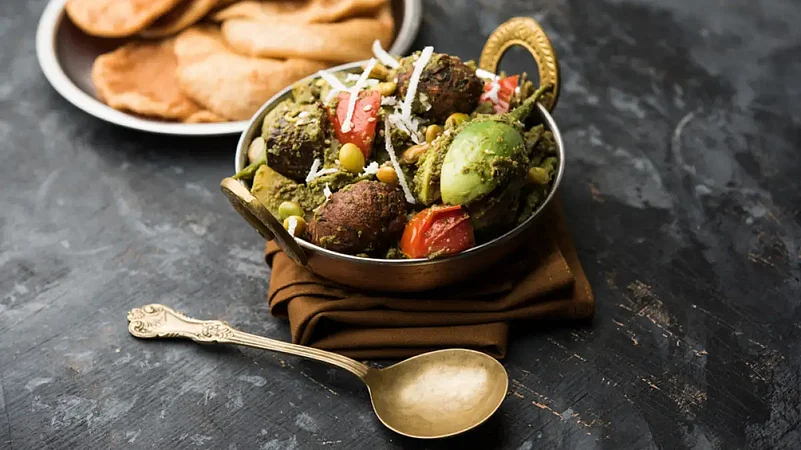
The commercial nerve centre of South Gujarat is as renowned for its love of food as it is for its diamond and textile industries. Food experiments have also resulted in dishes that are now part and parcel of Gujarati fare.
Where to go and what to eat
You can’t come to Surat and not relish Undhiyu, the elaborate mixed vegetable dish that’s a winter staple. The recipe derives its name from the word “undhu”, which means upside down—the dish was traditionally cooked upside down in earthen pots (matlu) fired from above. This Surti classic is made with winter vegetables. Apart from the many restaurants, head to Piplod for street food. The numerous stalls and joints offer traditional Gujarati snacks along with localised Italian, Chinese, and Mexican options. Be it Pav Bhaji, Dhokla, or Sev Khamni, there’s something for everyone at this eat street. Don’t miss the Surat staple, the Locho—a word that translates into “a mess” in Gujarati. Made from chick pea flour, the dollops of batter are seasoned with groundnut oil and served with butter, sev, coriander, and onion rings. Round off your meal with the Surati Ghari, which is made with “puri” dough and studded with a delicious filling of mawa, sugar, and gram flour.






